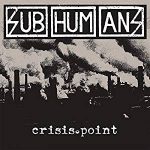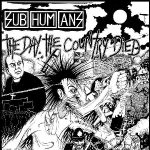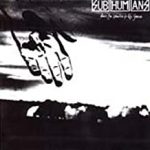Dick Lucas is the singer for Subhumans, who are regarded to be one of the most important and influential anarcho-punk rock bands, with songs that have railed against war, corporations, politics, and oppression with unmatched ferocity.
Subhumans formed in 1980 in Southwest England, and after three EPs released their first album Day the Country Died in 1982. This was followed by the album From Cradle to Grave in 1983, featuring the 16-minute title track. Several more releases followed before the band broke up in 1985. Fortunately, Subhumans reunited in the 1990’s, and they recently released Crisis Point, their first new album in twelve years. The band has had the same line-up since 1983.
This interview was for a preview article for noozhawk.com for the 10/21/19 Subhumans concert at Discovery Ventura in Ventura, California. It was done by phone on 10/12/19. (Publicity photo)

Jeff Moehlis: The Subhumans just released a new album, the first one in twelve years. Can you tell me a bit about that album and how it came together?
Dick Lucas: It came together in hops and leaps and starts, separated by months in between getting new songs together. Because, basically, Trotsky our drummer lives in Germany, and the rest of us live in the U.K., and even in the U.K. we don’t actually live in the same town anymore. So the chances of us practicing sort of averaged out to once or twice a year, over the last twelve years. So the production of new music and songs was extremely slow. That’s why it took so long.
And then we had this tour coming up, and Pirates Press were interested in doing our next record, and we thought it’d been long enough already. We had about six or seven songs, half of those only half-formed. So last March or April we went over to Trotsky’s place in Germany and met for a week, and knocked together the songs that we had half-formed, then came back and did some more practice rehearsal stuff in April in the U.K., and invented a couple more songs that were brand new, and then went straight to the studio to record them. We’d played them all of about once or twice each live. Normally a song really improves if you play it a lot live, for a year or so. You know exactly what speed it’s best at, and you’ve made little adjustments to it. We didn’t have a chance to do any of that for at least half the songs. But that being said, it still retains a sort of rawness that we haven’t achieved since about thirty odd years ago.
JM: I’ve enjoyed listening to the new album, which is pretty intense. Is it safe to say that the Subhumans have no intention of slowing down, or mellowing out?
DL: [laughs] No we don’t. The word “intention” assumes some sort of planning to what we do, and there really isn’t much. We just carry on as we are while we’re still happy doing it – which we are – and we’re still enjoying it – which we are – and we’ve still got the energy to make up new songs – which we have. It’ll come out as it does. There’s no plan to follow any musical direction other than the one we just end up in doing what we do instinctively, I guess. We’re not ones for planning ahead and making maps of where we should go on year three, and all that rubbish [laughs].
JM: Subhumans formed almost 40 years ago. Why do you think that the early music of the Subhumans still resonates today?
DL: Because it’s of its time, but it’s also of where we are now, in terms of lyrical content and outlook on the state of the world, which is an angry, negative outlook, generally speaking. Like the song said, “It’s Gonna Get Worse”, and then, guess what – it did. The world’s in a worse mess now than it has been for a very, very long time indeed – politically, socially, economically, ecologically, in every sort of way there’s just so much getting worse. People like it because the music’s not tricky to get into. It’s fun to listen to, it’s got a good beat, it’s got energy. The lyrics for the most part tend to mean something, which means they don’t sort of fade through overhearing, I guess.

JM: When you think back on the first album, Day the Country Died”, what are your reflections on it, in terms of recording it, and what it meant for the band?
DL: Because it was our first LP, we were very excited. Making the EPs was exciting enough, but to make a whole actual twelve-inch self-produced release was even more so. Also, we were very ignorant of how studios actually work, so we didn’t think, “Oh, this’ll sound better.” We were just sort of like, “This is just what it sounds like.” We had it all recorded and mixed in 4 days! There was no “Let’s do loads and loads of overdubs”, or all that stuff that you get told about and then used to over years and years of being in studios with different engineers who’ve got different ideas of what things should sound like. You get used to the intricacies of making a recording go from good to excellent. We had none of that knowledge. So we made the best of what we could. It might be that sort of raw, fresh attitude to recording that keeps it being a very popular record indeed.
JM: I know that album drew some inspiration from George Orwell’s book 1984. What do you think Orwell got correct when he wrote that book?
DL: Well, I think society now is a twisted mixture of 1984 and Brave New World by Aldous Huxley. The 1984 angle was all about overt oppression and control, with the cameras in your own home watching what you do at any point. There was absolutely no freedom whatsoever. Two plus two equals five, and all that sort of thing, where you have to say what the State told you to say, otherwise that’s it, your life is ended and you’ve got no more of the supposed freedoms that you had at all. I mean, there’s plenty of that going on. We’ve got the CCTV cameras, you’ve got the State watching us, being able to listen to this phone call, watching us through our laptops, and everyone basically being in fear of being watched and then, ironically, all going on social media and begging people to watch us do the minutiae of our everyday lives at the same time.
This is where Aldous Huxley’s Brave New World comes in, where everybody’s got so much convenience, and everything’s supplied – there’s like 58 channels on the telly to watch, there’s the internet where you can just do anything you want to do – so the totalized notion of freedom through these devices gives us the illusion of being in control of what we think, whereas we are being told what to think on every possible level all the time, and the notion of free thought is more available to someone living on the top of a hill or in a desert than surrounded by all this technical, social so-called interaction.
So on the Huxleyan side we have the illusion of freedom while we’re being controlled, and on the Orwellian side we’re under no illusion that we are controlled, and everybody’s at war with each other, and we’re all living in fear, and just being obedient, because of the fear of what happens if we’re not. So we’re in this weird mixture. But we are being controlled on all sides. It’s a pretty negative scenario I’m painting here, but A) you did ask, and B) it’s all true folks [laughs].

JM: How did your approach to the second Subhumans album, From Cradle to Grave, differ from the first album?
DL: It’s more of a question of how it came together. The 16-minute long B-side [title] track came together because over about a week I composed this very, very long song. I started it, and it just all carried on, and on, and on. And I said, “Look, I’ve got this song, it’s like four pages long. What can we do with it?” And Bruce, the guitarist, said “I’ve got loads of ideas that haven’t been used yet,” and over the next three or four practice sessions we nailed it all together. That was something else. That was almost like progressive rock meets punk rock. That was unexpected, the way that came about.
JM: Were you a fan of progressive rock at all?
DL: Personally, I used to be a little bit. Bruce and Phil much more so, Trotsky to a certain extent. This was all very much pre-1976, and pre-punk rock. I mean, for me when punk rock came along I just completely stopped listening to any progressive rock whatsoever, because I realized that the only thing I liked about any progressive rock was the fast bits, of which there weren’t many. And there was loads of fast bits in punk rock [laughs]. It was like, “This is more like it” – condensing a whole bunch of King Crimson and Yes and Emerson, Lake, and Palmer LPs into three minutes of angst, singing about being bored teenagers. I was totally on board with this, and forget all that other rubbish. That was just pretentious crap, you know?
The influence is there in the music, because Bruce was into King Crimson and the aforementioned bands amongst other stuff, and Frank Zappa – he did take a lot of influence from him when it comes to playing guitar. He did experiment a lot with what could be done with it.
JM: What are some memories you have from the first time that the Subhumans toured in America?
DL: Well, we were just naive, innocent young boys from Wiltshire, so for us it was just a whole series of firsts. As daft as it sounds, it was the first time we’d been on an airplane, the first time we’d stayed in a hotel, the first discovery of pizza, the first discovery of chilis. I tried smoking some dried chilis in a roll-up once – that is not a good idea. It just makes you cough a lot, like an overdose of menthol cigarettes.
The first show was at the Olympic Auditorium in L.A., and we drove the van into the venue. Never done that before. Never played in front of 3000 people before, never seen stage diving, never seen a circular pit going on. We didn’t know what the hell was going on. We were just confused or amazed, depending. Quite a lot of stuff that since then can be taken for granted. We had a great time, and we learned a lot.
JM: What advice would you give to an aspiring musician?
DL: Keep aspiring. Don’t be let down by expectations of fame and grandeur, because you probably won’t get it. The most important thing is to believe in what you’re doing as a creative release of your energies, and if anybody starts liking you as a result, then that’s a bonus. People can see through a band that pretends to having a good time. There’s an energy that comes out of music that is original and where the bandmembers are all having a good time doing it. And people like that. You’ve got more chances at success if you believe in yourself and stay true to your nature, no matter what the music is like.
JM: What’s in the works, and will we have to wait twelve years for the next album?
DL: It would be a better idea to do one a bit faster than the last one, because by the time the next one comes, at least a couple of us will be approaching an age at which most people die. So we’d better get on and do one before that [laughs].
JM: Have you been writing any new songs already?
DL: No. Since this one came out, it’s been a case of touring and getting the record out. We went to the East Coast of America, and then we’re going to the West Coast. The problem that still exists is us living in different countries, but I’ll be carrying on writing songs, and Bruce will be carrying on creating tunes, as will Phil, and it will all come together a lot quicker than twelve year’s time.


Discussion
No comments for “Interview: Dick Lucas”